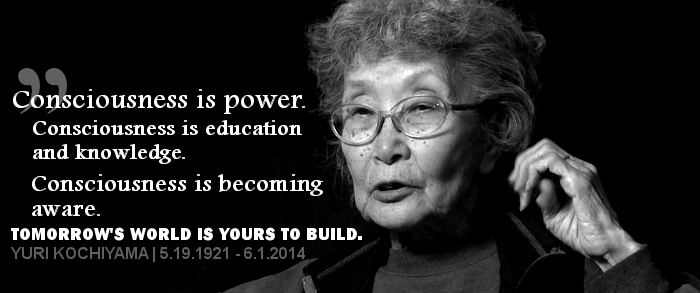Yesterday, the White House’s Initiative on Asian Americans and Pacific Islanders (WHIAAPI) posted this post on the White House’s official blog. The post was written by Kiran Ahuj, WHIAAPI’s Executive Director.
Today, we honor the legacy of Yuri Kochiyama, a Japanese American activist who dedicated her life to the pursuit of social justice, not only for the Asian American and Pacific Islander (AAPI) community, but all communities of color.
Mary Yuriko Nakahara was born in 1921 in San Pedro, California. She and her family spent two years in an internment camp in Jerome, Arkansas during World War II, and the similarities she saw between the treatment of Japanese Americans during World War II and African Americans in the Jim Crow South inspired her to dedicate her life to activism on behalf of marginalized communities. In the early 1960s, Yuri and her husband Bill Kochiyama, a decorated veteran of the all-Japanese American 442nd Regimental Combat Team of the U.S. Army, enrolled in the Harlem “freedom schools” to learn about black history and culture. Soon after, Yuri began participating in sit-ins and inviting Freedom Riders to speak at weekly open houses in the family’s apartment. She was a strong voice in the campaign for reparations and a formal government apology for Japanese American internees through the Civil Liberties Act, which President Ronald Reagan signed into law in 1988.
Yuri leaves behind a legacy of courage and strength, and her lifelong passion for justice and dedication to civil rights continue to inspire young AAPI advocates today. I am moved by her leadership and her unwavering commitment to building coalitions to improve the quality of life and opportunities for all Americans, regardless of background.
As Yuri stated at a press conference outside the Federal building in downtown San Francisco in 2002, “An injury or injustice to one is an injury and injustice to all.”
Today, we remain commited to our country’s ideals of protecting civil rights for all. We continue to increase access to federal resources and services for Limited English Proficient (LEP) communities, promote resources and tools to combat bullying and harassment of AAPI students, and work to improve conditions, protections, and pay for immigrant, low-wage workers. The contributions of Yuri Kochiyama and other civil rights champions inspire us to ensure that all Americans reach their fullest potential regardless of who they are or where they come from.
Thank you to the White House for recognizing the legacy of an iconic civil rights leader.

